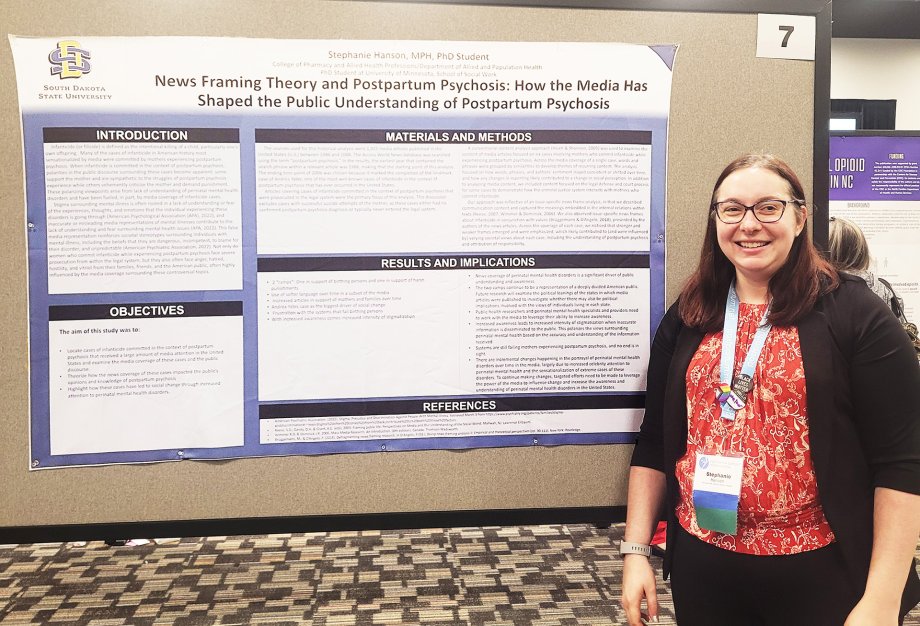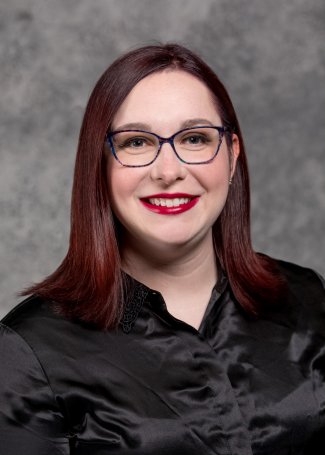

SDSU instructor plans work to improve perinatal health in South Dakota
Stephanie Hanson, a population health instructor from the Department of Allied and Population Health at South Dakota State University, recently presented a poster at the Postpartum Support International annual conference in Kansas City, Missouri.
In addition to her position at SDSU, Hanson, who has a Master of Public Health in global health epidemiology and disease control, is also working to complete her doctorate in social work from the University of Minnesota, Twin Cities. Hanson’s study and professional work are focused around researching and improving outcomes related to perinatal mental health disorders.
According to Postpartum Support International (PSI), perinatal mental health disorders (PMHDs) include depression, anxiety, posttraumatic stress disorder, obsessive-compulsive disorder, bipolar disorders and psychosis experienced during the perinatal period.
The PSI annual conference features presentations on the top research on perinatal mental health in the world.
Given her work and that she is a board member for the South Dakota chapter of PSI, Hanson was right at home at the PSI annual conference.
“There's nothing like being in a room full of people who just get what you do and what you're passionate about,” Hanson said. “At the conference, you quickly get the sense that everyone is there to support each other and to learn from one another to better the field of work around perinatal mental health.”
Public awareness
The poster Hanson presented covered an extensive analysis of news coverage of cases of infanticide committed in the context of postpartum psychosis. To complete this work, Hanson analyzed 1,925 news articles published in the United States between 1986 and 2006 to assess how news coverage impacted public opinions and knowledge of postpartum psychosis.
In the analysis, two “camps” or categories of news articles were identified: one that supported the birthing person and one that supported harsh punishment. Findings included a use of softer language and support of mothers and families over time in a subset of the media, frustration with the systems that fail birthing persons, that an increase in awareness comes with an increased intensity of stigmatization and that the Andrea Yates case was the biggest driver of social change.
Overall, the work found that news coverage is a major driver of public understanding and awareness, that the American public is deeply divided on this topic, and that systems are still failing mothers who experience postpartum psychosis.
To learn more, view the full poster online.
Hanson’s presentation spoke to the need that exists for the public to not only be aware of PMHDs but also to understand them. For Hanson, “the most moving part of the conference for me was the panel discussion on postpartum psychosis where survivors shared their stories. There was just something about hearing their stories and hearing them talk about their experiences that goes straight to your core.”
A PMHD survivor
Hanson is herself a survivor of perinatal depression, perinatal anxiety, perinatal PTSD and perinatal psychosis. Despite having more knowledge of PMHDs than most and being well connected to available resources, “I still had a very hard time with these issues, which makes me think about individuals who experience PMHDs and aren't as fortunate as I was,” Hanson said.
“I want to do my part to ensure that others don't have the same experiences that I did,” she continued. “This work is a way for me to give back to the communities I live and work in, and it is also healing for me in so many ways.”
Hanson explained that PMHDs don’t discriminate on who they impact. “They can happen to anyone, moms and dads alike.”
One in five mothers and one in 10 fathers will experience perinatal depression, and PMHDs can have long-term effects on the health of the parents and the baby if not recognized and treated effectively.
In addition to presenting and attending presentations and panels at the conference, Hanson also used the time to acquire a Perinatal Mental Health Certification.
Making an impact
Hanson only began at SDSU in fall 2022 but has already made a major impact.
“Steph has been a great addition to our team. Steph has a passion for her research but is also a great teacher and adviser to our Master of Public Health students. Her academic career is off to a great start, and I can't wait to see what happens next,” said Dan Hansen, dean of the College of Pharmacy and Allied Health Professions.
Even before completing her doctorate, Hanson is making a big splash in the field of population health, particularly as it relates to perinatal mental health. She has recently co-authored three articles that are set to be published in peer-reviewed journals later this year.
Titles for these include “The role of prior trauma exposure and subsequent post-traumatic stress disorder in reactions to the COVID-19 pandemic: A qualitative study,” “Rural-Urban Differences in Health Care Unaffordability” and “Rural-Urban Differences in Health Care Unaffordability during the Postpartum Period,” which will be published in the journals Social Science and Medicine, Journal of Rural Health, and Medical Care, respectively.
Since coming to South Dakota, Hanson has seen a need to increase knowledge, awareness and resources related to perinatal mental health. She said that “maternal and child health outcomes in South Dakota are far from ideal.”
In response, Hanson has been working through her position with the Community Practice Innovation Center on grant applications which, when accepted, will result in major programs to increase knowledge, awareness and resources for perinatal mental health in South Dakota.
“I am hoping to be able to complete some groundbreaking work in the state very soon, and I look forward to being able to have a positive impact on the experiences of individuals experiencing PMHDs in a setting where it is so desperately needed,” Hanson said.
- Contact:
- Telephone number: 605-670-9658
Republishing
You may republish SDSU News Center articles for free, online or in print. Questions? Contact us at sdsu.news@sdstate.edu or 605-688-6161.

